jis.uy 2019 - Scrum Zombies & Orcs teams
Oct 3, 2019 (4 hours)
Edificio Polifuncional "José Luis Massera" - FING - Montevideo - Uruguay
This talk was about two different types of scrum teams, how they became those monsters (zombies and orcs) and how they can come back to life (if they can!). It was held at the Faculty of Engineering as part of jis.uy 2019.
IS.uy is a program to promote and develop Software Engineering in Uruguay. The intention is to generate synergy, encourage and strengthen industry-academy links by building a strong community in software engineering.
They have two "products" known as mis.uy and jis.uy. The first one, mis.uy is the Meetup of Software Engineering of Uruguay. The last one (jis.uy) is the Uruguay Software Engineering Conferences which happens once a year and is organized by the best engineering universities of the country.
This year they accepted my proposal to talk about "Zombies & Orcs Scrum Teams", something I've been wanting to do for a long time.
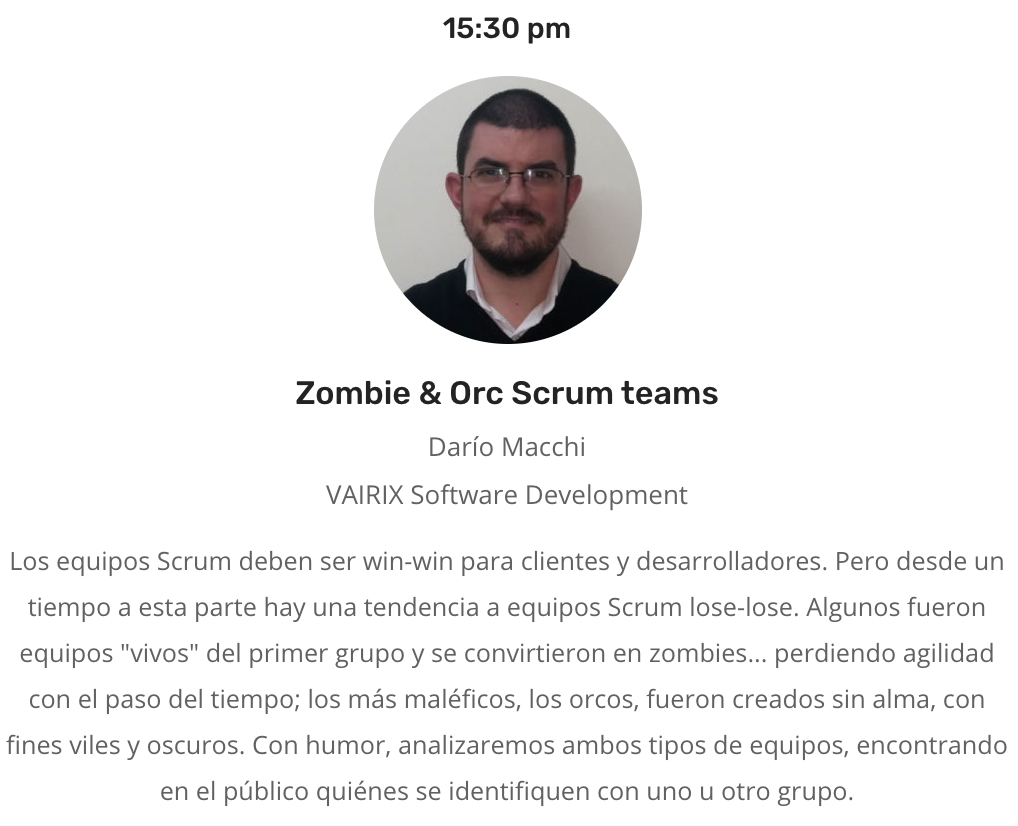
Transcript
0:00:22.320,0:00:23.800 Shall we get started? 0:00:23.800,0:00:30.520 My name is Darío Macchi and I will be l talking about Zombie and Orc Scrum Teams. 0:00:30.520,0:00:33.880 The idea is to cover these two topics. 0:00:33.880,0:00:39.520 There is little time and a lot to say so I will go straight to the point. 0:00:39.520,0:00:42.480 But first of all: Do you all know what Scrum is? 0:00:42.480,0:00:43.680 Yes? 0:00:43.680,0:00:48.040 Raise your hand if you use Scrum or have theoretical knowledge of Scrum. 0:00:48.040,0:00:52.600 Everybody? Well, perfect. The first slide will be very easy, then. 0:00:52.600,0:00:55.400 But just for those who didn’t raise their hand. 0:00:55.400,0:00:56.880 What do we understand by Scrum? 0:00:56.880,0:01:00.680 We have a client that brings a value proposition, right? 0:01:00.680,0:01:06.600 When that value proposition is understandable and clear, the team takes that value proposition, 0:01:06.600,0:01:11.040 they work on it for a period of time we call “sprint”. 0:01:11.040,0:01:17.760 During that period of time, things come up which the team solves: impediments, problems, situations. 0:01:17.760,0:01:21.560 Until this value proposition becomes a product increment. 0:01:21.560,0:01:27.160 At this point, when we believe it’s ready, we deliver it to the client, and basically 0:01:27.160,0:01:29.320 that is where that workflow ends. 0:01:29.320,0:01:34.640 The amount of value that we generate in that period of time is what we usually call “speed”. 0:01:34.640,0:01:37.200 So far it’s simple: you already know what Scrum is. 0:01:37.200,0:01:39.760 Are you sure you know what Scrum is? 0:01:39.760,0:01:44.360 Yes? Stay with that question because you may hesitate later. 0:01:44.360,0:01:46.400 Yes? Good, let’s continue. 0:01:46.400,0:01:51.120 Let’s go to the main topic which is “What are Zombies?” 0:01:51.120,0:01:55.480 What do we understand by a Zombie, technically? 0:01:55.480,0:01:58.600 A zombie is a being that was once alive, right? 0:01:58.600,0:02:01.480 They had a heart with a strong heartbeat. 0:02:01.520,0:02:07.680 But as a result of contagion of the zombie gene 0:02:07.680,0:02:13.840 they basically became a crude and slow being. 0:02:14.080,0:02:19.560 A being that has reduced intelligence, and due to that reduced intelligence 0:02:19.560,0:02:22.160 needs to act in big numbers in order to achieve their goals. 0:02:22.160,0:02:29.500 That’s why it is said that zombieism is highly contagious in healthy societies. 0:02:29.500,0:02:35.280 Now, what does this have to do with Scrum? Well, let’s see. 0:02:35.280,0:02:42.480 A Zombie Scrum Team is a team that lacks a heartbeat. 0:02:42.480,0:02:45.040 From the outside, they look like a normal Scrum team. 0:02:45.040,0:02:48.000 They have all their ceremonies, their roles, and so on. 0:02:48.000,0:02:49.440 But its heart does not beat. 0:02:49.480,0:02:55.060 What is the heart of an Agile team? Sorry, of a Scrum team? 0:02:55.060,0:02:58.940 The constant delivery of value in each sprint. 0:02:58.940,0:03:06.260 So, these teams do not have a heartbeat, which means they are not delivering value in each sprint. 0:03:06.260,0:03:15.420 If that is the heart of a Scrum team, their blood is the need to improve that value delivery with each sprint, right? 0:03:15.420,0:03:26.280 Clearly, Zombie teams don’t have either of these characteristics, even though, as I said, they abide by all the Scrum roles and ceremonies. 0:03:26.280,0:03:42.560 So, what happens here? Let’s look into some symptoms that will allow you to identify when a team is becoming a zombie team, and try to revert that effect. 0:03:42.580,0:03:46.260 The slides are going backwards, let’s go forward. Good, there. 0:03:46.260,0:03:54.760 I had to Google what sound a zombie would make, how we could spell the sound a zombie makes. And this is the best I could find, okay? 0:03:54.760,0:03:58.920 And this would mean “Symptoms” in zombie slang, just an editor’s note. 0:03:58.920,0:04:09.960 Good. All of you told me you know what Scrum is, right? So I assume you all hold retrospective meetings, right? Do we all agree? Raise your hand once more. 0:04:09.960,0:04:13.160 Yes? You all hold retrospective meetings, you know what they are. Well, perfect. 0:04:13.160,0:04:21.320 Now, how many of you hold retrospective meetings where you challenge the team with creative activities? 0:04:21.320,0:04:34.060 How many of you have taken part in retrospective meetings where the team tries to find clear goals, and those goals are translated into concrete and defined actions? 0:04:34.060,0:04:45.880 How many of you have taken part in retrospective meetings where the team is asked to dream big, and then those dreams are expressed through actionable points? 0:04:45.880,0:04:56.740 How many of you have analyzed risks during retrospective meetings and have looked for solutions as a team, or have simply analyzed how you feel working together? 0:04:56.740,0:05:00.660 Raise your hand: How many of you have this happened to? 0:05:00.660,0:05:12.520 Now, how many of you have had to resort to the good old sad, happy, and light bulb emojis during retrospective meetings? 0:05:12.520,0:05:21.280 Good. If you find yourself belonging to the first group, in the first Scrum team, I can tell you that you can be at ease. 0:05:21.280,0:05:24.860 You will continue to be alive, and will avoid being zombies. Okay? 0:05:24.860,0:05:40.240 As for the second team, whom I intentionally didn’t ask to raise their hands so as to not make them feel bad, but I reckon it’s the majority, this is possibly an early sign that you are becoming a zombie without your being aware of it. 0:05:40.240,0:05:51.860 Right? This is a first symptom that the team is losing agility, that their heartbeat is dropping. They are starting to abandon certain things. 0:05:51.860,0:05:57.220 Let’s have a look at what a developer said on this topic: 0:05:57.220,0:06:08.380 “Really? I have to go to these dumb retrospective meeting again? Well, I’m bored anyways. Who cares? At least the Scrum Master is here today. Gasp. Like he’s of any use.” 0:06:08.380,0:06:12.040 Right? I see some of you laughing. Good. 0:06:12.040,0:06:14.900 What is wrong with this guy? He doesn’t get it. 0:06:14.900,0:06:20.400 This person does not understand the value of a retrospective. He does not understand... 0:06:20.400,0:06:22.400 What makes an Agile team boring? 0:06:22.400,0:06:27.520 Also, if you are bored within an Agile team, the retrospective meeting is precisely the place to address that. 0:06:27.520,0:06:32.820 In fact, he didn’t even understand the value that a Scrum Master has within Scrum. 0:06:32.820,0:06:38.060 And the Scrum Master himself doesn’t seem to understand as he apparently doesn’t show up very often. 0:06:38.060,0:06:40.420 But everything about this statement is wrong. Right? 0:06:40.420,0:06:51.340 I mean, there are several issues that are related to what we talked about earlier: With the blood, with the need to improve. Right? Good. 0:06:51.340,0:06:54.860 Another symptom... I ranked this first one as the worst of them. 0:06:54.860,0:07:01.520 Because I personally think retrospective meetings are very important, and it’s there where we usually start to turn into zombies. 0:07:01.520,0:07:04.200 Let’s look at this other symptom then. 0:07:04.200,0:07:14.000 “Complete functionalities are desirable, but if it doesn’t happen in this sprint, we can finish them in the next one… After all, we aren’t going to production at the end of the sprint”. 0:07:14.000,0:07:25.920 Again: We said that the heart of a Scrum team is precisely adding value sprint after sprint. And now we are confronted with this affirmation. 0:07:25.920,0:07:35.200 The fact that we go or don’t go to production at the end of the sprint is not up to us. We committed to delivering a certain value to the client by the end of the sprint. 0:07:35.200,0:07:42.020 And the client will decide what he wants to do with that value. Our responsibility is delivering working software to the client. Right? 0:07:42.020,0:07:47.960 So again, when we fall into these kinds of issues is when we start becoming zombies. 0:07:47.960,0:07:49.700 Let’s look at another symptom: 0:07:49.700,0:08:00.340 “In the last sprint we did the whole backlog, it wasn’t so hard… in this sprint there were tasks that will remain as pending for the following sprint, so we didn’t have a sprint review as we don’t have anything to prove anyways. 0:08:00.340,0:08:11.540 I don’t know why we didn’t stretch the sprint duration, like we did in the last one, to reach the scope that we committed to… After all, iterations are artificial…”. 0:08:11.540,0:08:23.620 We may be witnessing another symptom in this affirmation, and that’s when the team may be doing what is known as “cherry-picking” of Scrum activities. Cherry-picking of GIT. 0:08:23.620,0:08:25.800 Those who have worked with GIT know what it means. 0:08:25.800,0:08:38.260 Basically, the team is picking what Scrum practices to include, at which point in time, and adapting them to their situation in order to make the whole thing fit. 0:08:38.260,0:08:47.920 So we stretch sprints to accomplish goals. And maybe one day we don’t do a review meeting because we don’t have anything to show, like in this example. 0:08:47.920,0:08:53.500 Or, given we are behind schedule, we skip the retrospective and don’t do it. Right? 0:08:53.500,0:08:58.180 Let’s look at the last symptom of “Zombieism”: 0:08:58.180,0:09:06.180 “I don’t care whether the overall product doesn’t meet the client’s expectations… I’m here to program.” 0:09:06.180,0:09:10.240 Has anybody heard this affirmation at some point? Yes? Good. 0:09:10.240,0:09:13.820 Again: this person doesn’t get it. Right? 0:09:13.820,0:09:22.160 Beware: technical expertise and having people that know how to program is the core of an Agile software development team.There’s no doubt about it. 0:09:22.160,0:09:28.660 If we don’t have people who know what they are talking about technically and that use Agile software development practices, 0:09:28.660,0:09:35.560 as opposed to Agile management, we’ll never be able to accomplish what Scrum promises us in terms of delivering working software at the end of each sprint, 0:09:35.560,0:09:40.340 or the ability to tweak software as we please to adapt it to the client’s needs. 0:09:40.340,0:09:51.980 That benefit that Scrum sells and that we all have sold by advocating for Scrum cannot be accomplished if we don’t have software developers who are good at Agile software development practices. 0:09:51.980,0:09:56.760 But that doesn’t mean we shouldn’t consider the client’s expectations. That’s just wrong. 0:09:56.760,0:10:02.180 This is, again, another symptom that the team is going the wrong way. 0:10:02.180,0:10:09.260 Now: What treatment or cure is there for Zombieism? 0:10:09.260,0:10:13.040 Well, we can do several things. First of all, we can try talking to the team. 0:10:13.040,0:10:23.240 Many times, by facing the team and showing them these issues, they are able to realize those issues and can start healing themselves. 0:10:23.240,0:10:29.380 In other cases, one thing that can be done is introducing healthy team members to the team that is turning into a zombie team. 0:10:29.380,0:10:38.160 With the goal of getting that heart beating again. A sort of CPR, so that they start flowing again. 0:10:38.160,0:10:43.540 The other thing we can do is resort to the community. 0:10:43.540,0:10:52.540 There are many studies and activities that have been tested within zombie teams where they have succeeded in resuscitating them and get their heart beating. 0:10:52.540,0:10:58.840 For example, Zombie Scrum Resistance is a blog with a series of case studies you can turn to. 0:10:58.840,0:11:06.620 And my personal favorite, which is to stir the waters. Meaning, to somehow shake the team back into life. 0:11:06.620,0:11:15.280 We can do this through retrospectives. There’s some things like what I mentioned today about seeing the bigger picture and then translating that to concrete actions. 0:11:15.280,0:11:24.000 Another one is “Smell-o-meter”, which implies building a smell-scale of sorts within the company. Things that smell good, things that smell bad. 0:11:24.000,0:11:27.900 The author illustrates is rather well with that phrase. 0:11:27.900,0:11:34.500 Another thing we can do is change the sprint duration. You might think: “That is a weird thing to do in Scrum. You don’t mess with sprint duration”. 0:11:34.500,0:11:39.900 It isn’t messed with mainly due to metrics. But here we are in the presence of a team that doesn’t generate value and fails to achieve a great number of things. 0:11:39.900,0:11:46.680 Altering the sprint duration in this case will work to stir the waters and make the team come back to life. 0:11:46.680,0:11:56.240 Starting each daily meeting with a recap of the sprint’s goal, which will force us to come up with a sprint goal in the planning meeting, which is good to have. 0:11:56.240,0:12:02.220 These are all things we can do to wake this team up and for them to stop being a zombie team. 0:12:02.220,0:12:08.160 Do we all agree? Great, this is it for our zombie friends. 0:12:08.160,0:12:10.720 Let’s move on and talk about our friends the Orcs now. 0:12:10.720,0:12:15.860 What are Orcs? What would be the technical definition of an Orc? 0:12:15.860,0:12:27.200 Orcs used to be beautiful beings. But an evil force took them and turned them into these ugly, dirty beings we see on screen. 0:12:27.200,0:12:40.500 These evil forces are usually more intelligent forces. And what they do is create these orcs for their own benefit. 0:12:40.500,0:12:52.520 As they don’t want the orcs to rebel, what they do is reduce their intelligence so that they require strength in numbers to reach their goals, much like zombies. 0:12:52.520,0:12:57.980 They are usually used as cannon fodder for the benefit of this evil mind that creates them. 0:12:57.980,0:13:02.000 So far, that’s the definition of what an Orc is. 0:13:02.000,0:13:08.020 Now again: What does an orc have to do with a Scrum team? 0:13:08.020,0:13:18.400 Before we dive into the definition of an Orc Scrum team, let’s analyze a short phrase to get started on the topic. 0:13:18.400,0:13:22.720 There are some authors that say that “Scrum is the new Waterfall”. 0:13:22.720,0:13:29.160 I prefer the phrase that says “Scrum is the new black”. Do you know this phrase? Do you know where it comes from? 0:13:29.160,0:13:39.700 In the fashion world, when somebody says that something is the new black, they are saying that that thing, for whatever reason, or lack thereof, became fashionable. 0:13:39.700,0:13:48.120 So if somebody says “This summer, lettuce green will be the new black”, we all start wearing lettuce green without any sort of explanation. Right? 0:13:48.120,0:14:00.800 So my point here, and I brought this because I like the relation the the fashion industry, is that to me, “Scrum is the new black” means that Scrum became so popular because Scrum is a fad. 0:14:00.800,0:14:06.640 And there is some reason for it to be fashionable, which we will analyze shortly. Why? 0:14:06.640,0:14:17.680 There are a lot of managers of companies with a typical pyramid hierarchy who, when pressured by their environment, need to be agile and need to prove they are agile. 0:14:17.680,0:14:23.700 Or appear to be agile. And Scrum is a perfect framework for this. 0:14:23.700,0:14:33.380 Because Scrum is a framework that does not guarantee results within Agile software development in the software industry. 0:14:33.380,0:14:42.060 Remember: Scrum is a framework, a container for developing anything in an Agile way. 0:14:42.060,0:14:50.860 But for it to work, to develop Agile software, it must be paired with Agile software development practices. 0:14:50.860,0:15:06.740 So many of these managers take Scrum, modify it, add and remove things from it, and showcase a false Agilism to the outside world. 0:15:06.740,0:15:12.680 That’s why I like this phrase. Because Scrum is something that has become fashionable for different reasons. 0:15:12.680,0:15:20.060 Right? Good, now you can wake back up, and let’s return to the topic of Orcs to see what’s the deal there. 0:15:20.060,0:15:23.860 What is an Orc Scrum team? 0:15:23.860,0:15:31.380 Well, precisely, these evil characters that took beautiful beings and turned them into the orcs we spoke about in the definition 0:15:31.380,0:15:42.480 are those managers that take a healthy team, make alterations to it, they impose Scrum on them, 0:15:42.480,0:15:48.160 and ultimately turn them into something that appears to be Agile but is not. 0:15:48.160,0:15:54.500 As I see you’re still not fully grasping the idea, let’s look at some examples or symptoms of this, like we did with the zombies. 0:15:54.500,0:15:57.400 So let’s look at some symptoms. 0:15:57.400,0:16:05.000 Again, I took the liberty to do a Google search for what an Orc might sound like and be able to spell it. This is the best I came up with. 0:16:05.000,0:16:10.820 Please tell me: How many of you go to retrospective meetings with your laptops? 0:16:10.820,0:16:12.900 I see some of you laughing in the audience. 0:16:12.900,0:16:25.740 How many of you, within your daily meetings, report to a product manager or scrum master who also happens to be your boss? 0:16:25.740,0:16:35.400 How many of you have a PM who assigns tasks to each of the Scrum team members? 0:16:35.400,0:16:46.280 Or worse, how many of you have a PM who does the planning based on his expert judgement, then distributes the tasks, and expects us to reach the goals or scope they established? 0:16:46.280,0:16:54.360 Do any of these sound familiar? If it does sound familiar, you may be a part of an Orc Scrum team, and not be aware of it. 0:16:54.360,0:17:02.260 Let’s look at some other examples or symptoms. This is from a manager’s perspective, right? So a manager says: 0:17:02.260,0:17:09.120 “Ok, I will be the Product Owner. You (sub-manager) will be the Scrum Master. We will have two-week long iterations, planning, dailies. 0:17:09.120,0:17:16.740 And on the last Friday what we’ll do is the team will show me what they have done, and then they’ll do a short retrospective. And that’s it. We are now Agile”. 0:17:16.740,0:17:24.840 And from an outside perspective, you have the ceremonies, you have the roles. Why wouldn’t we consider it a Scrum team? Right? 0:17:24.840,0:17:31.340 But clearly, this Scrum team is a long way from really having what a real Scrum should have. 0:17:31.340,0:17:46.100 Creating value in each sprint. Creating trust. That the software can adapt and support changes from one sprint to the next, and so on. 0:17:46.100,0:17:51.320 Remember that Scrum is a container. I’ll keep repeating this. 0:17:51.320,0:17:54.260 Let’s look at another example, another symptom. 0:17:54.260,0:18:04.160 “We’ve spent the past two months defining the new Agile process. I think that now that we’re finished, it’s ready and we can implement it in the company”. 0:18:04.160,0:18:13.540 Open parenthesis: The company this person is speaking about ranges from two to fifty people. It has teams of two people, teams of three people, teams of five… All the way to fifty people. 0:18:13.540,0:18:27.760 Now: Two months defining an Agile process? Two months for an Agile process to mature, which we know we will not be able to adapt to such disparate teams? 0:18:27.760,0:18:33.980 Put them to work from day one! Let the team itself be the one who generates that process on the go. 0:18:33.980,0:18:43.160 And at the end of two months - four iterations - you won’t have just one process. You will have five, or ten. One process for each team. But that is aligned to each team. 0:18:43.160,0:18:54.700 Where the team understands what they’re talking about, and are already creating value.This is clearly also a symptom that the team is turning into an Orc team. 0:18:54.700,0:19:01.720 Look at these other symptoms. Imagine a meeting around a large round table. 0:19:01.720,0:19:08.040 “Ok people, we need to be Agile. Any ideas?”. And from the bottom of the room, a hand is raised and the person says “Scrum?”. 0:19:08.040,0:19:17.220 After which, what tends to happen is the team camouflages what they’ve been doing so far. They camouflage the same activities and roles they used to have by using Agile terms. 0:19:17.220,0:19:20.560 And there you have it. They are now Agile. Right? 0:19:20.560,0:19:27.540 Again: This tends to happen, and it doesn’t represent the spirit of Agilism. 0:19:27.540,0:19:34.560 One last symptom. A Product Manager or Scrum Master within a retrospective meeting says: 0:19:34.560,0:19:46.320 “People, we hired you to be intelligent and self-manage. You should be able to organize yourselves. You’re already behind schedule! We need more functionalities, not more tests!” 0:19:46.320,0:19:52.440 Who hasn’t this happened to? Do you find it familiar? Well, good. 0:19:52.440,0:19:59.100 Again: A person that says this doesn’t understand anything about creating and developing software and creating value sprint after sprint. 0:19:59.100,0:20:09.600 How could I be able to create value or deliver new functionalities to the client in the following sprint if I well may be breaking the ones I delivered in the previous sprint? 0:20:09.600,0:20:15.940 In fact, I don’t even know if I finished a functionality if I don’t have a way to test it. 0:20:15.940,0:20:29.660 Coming back to the idea of Scrum as a container: One of the areas in which Scrum is weak is in being able to ensure the use of Agile software development practices. 0:20:29.660,0:20:37.040 Scrum doesn’t tell you how to do things. It tells you that you have to hand over a deliverable at the end of each sprint. But it doesn’t tell you how to do it. 0:20:37.040,0:20:49.540 That’s why we need to inject Agile software development practices in order to achieve our goals, which we’ll discuss further towards the end of our talk. 0:20:49.540,0:20:55.480 And as sprints go by, the goal is for our software to remain stable and working. 0:20:55.480,0:20:59.560 That the value we deliver to the client is real value as opposed to something that only lasts for one sprint. 0:20:59.560,0:21:10.560 Do we agree? Good. Let’s now analyze the treatment we can apply to Orc teams. 0:21:10.560,0:21:23.020 Well, what can we do with these teams? Unfortunately, “Orcism” - to give it a term - is incurable. It’s not like Zombeism, which can be cured. There is no way back from this. 0:21:23.020,0:21:31.160 What people who have belonged to Orc teams can try to do is improve their condition, have the best time they can, 0:21:31.160,0:21:37.720 and know that they will not revert to those beautiful beings they started as. And they will have some scars. 0:21:37.720,0:21:44.500 But what they can do is try to come closer to the idea of Agilism and ask themselves: 0:21:44.500,0:21:51.800 “Can we contact the clients and the people that create the value for the product we’re developing? 0:21:51.800,0:21:57.080 Can we think more in terms of product and not so much in terms of process?” 0:21:57.080,0:22:05.260 Another thing we can do and that is totally up to us is getting better at Agile software development practices. That’s totally up to us to do. 0:22:05.260,0:22:19.340 We can start implementing practices such as TDD, Extreme Programming. Pair programming can be one of those practices. 0:22:19.340,0:22:25.780 Meaning, there is a set of Agile software development practices that have stood the test of time and can be used. 0:22:25.780,0:22:34.980 These have been tested and there have been experiments that show their positive results. So those are up to us to implement. We can use them. Right? 0:22:34.980,0:22:42.140 We can also follow Jeffries advice, who says that what we can do is finish one, two or three stories. 0:22:42.140,0:22:48.300 Then take the abuse for not having finished everything that was planned for the sprint. 0:22:48.300,0:22:58.280 And in the next planning meeting, try to start from the reality we are showing and living as opposed to a fantasy that could never have been achieved from the get-go. 0:22:58.280,0:23:07.100 Meaning: “Look, we can do two, three, four full functionalities that are tested and integrated, and that don’t break anything. If you want ten, it cannot be done”. 0:23:07.100,0:23:14.940 So, within a planning meeting, show the reality as it is, and not a fantasy. Right? 0:23:14.940,0:23:18.060 Jeffries says this in his own words: He says he has been in that situation. 0:23:18.060,0:23:26.680 And that instead of doing what one would do, which is running away from a certain situation or a certain company, one should try to hold their ground, do things right, 0:23:26.680,0:23:33.120 develop and work in a professional manner, do a good job and keep it visible, working and tested. 0:23:33.120,0:23:41.800 And then try to make people see reality for what it is. Right? Good. 0:23:41.800,0:23:46.540 Some final notes in regards to Agilism. 0:23:46.540,0:23:59.220 And I’ll come back to the concept of Scrum as an empty container that we need to fill with good practices to be able to deliver. Right? 0:23:59.220,0:24:08.940 Before we dive into that, let’s see what some reputable authors think. People that signed the Agile Manifesto back in its origins. 0:24:08.940,0:24:15.300 Let’s see what they say about the current state of Agilism. 0:24:15.300,0:24:21.500 Ron Jeffries says that developers must abandon Agile methods with given names. 0:24:21.520,0:24:32.480 What he is conveying - although the title looks to shake up the community - is that we should try to come closer to what is the Agile Manifesto 0:24:32.500,0:24:41.780 and stop consuming “packaged methodologies” where we basically follow the manual. Right? 0:24:41.780,0:24:51.180 Now, earlier today we spoke against “cherry-picking” Scrum activities because that turns us into zombies. And now I’m saying not to follow the manual because it’s also wrong. So what gives? 0:24:51.180,0:24:55.480 The problem is that there are authors that state that there is no hope for Scrum anymore. 0:24:55.480,0:25:06.480 It’s over. Scrum started to become a sort of a foul word and there are lots of people across the globe who disagree with Scrum given what it has turned into. 0:25:06.480,0:25:12.600 For what we were saying earlier. That it became a fad and started to be used to create these Orc teams. Right? 0:25:12.600,0:25:20.540 For example, Fowler says one of our main problems as an Agile community is that we need to try to find the “Industrial Complex”. 0:25:20.540,0:25:29.220 Meaning, the whole business that was created around the sale of Agile services: consulting, books, certifications. 0:25:29.240,0:25:37.280 This is one of the main problems that have to be dealt with. And it’s somewhat related to these given name methodologies. 0:25:37.280,0:25:53.580 The second problem Fowler speaks of is what I’ve been talking about so far. And that is that there is a lack of recognition for technical skills within the Scrum community. Within Agilism in general. 0:25:53.580,0:26:01.740 One trend that is going on is that in different Agile conferences, less and less software developers are attending them, 0:26:01.740,0:26:16.980 and there’s more attendance from managers, PMs, Scrum Masters and people who don’t really have the ability to create software that is compliant with what we are selling and promising. 0:26:16.980,0:26:30.480 At first, it was developers who encouraged Agilism. And in fact, if one reads the first books on Agile, they will notice that the case studies which were successes were lead by this kind of people. 0:26:30.480,0:26:40.900 People who were and are really good developers and who write code every day. Raise your hand if you write code every day? 0:26:40.900,0:26:46.320 There are many of you here. But maybe half aren’t raising their hands nowadays. 0:26:46.320,0:26:54.520 This - and there’s more people here who do it than I would have thought - is happening within the different communities related to software engineering. 0:26:54.520,0:27:07.100 There are lots of people talking about how to create software and less people in that group who actually write code and ensure that the product complies with the Agile philosophy. 0:27:07.100,0:27:10.840 Who implement Agile software development practices. 0:27:10.840,0:27:21.460 On this note, Robert C. Martin says that there are technical foundations - like TDD and many others - that are being left out of Scrum Certifications. 0:27:21.460,0:27:32.760 That is why the community is asking, in a way, that we return to the Agile Manifesto and that we abandon those practices that have a first and last name. 0:27:32.760,0:27:38.620 Right? Good. As we’re short on time we’ll continue with another topic. 0:27:38.620,0:27:44.760 Yes? Great. Let’s continue. 0:27:44.760,0:27:50.520 The first thing Fowler says is related to what we discussed about the Orcs. 0:27:50.540,0:28:01.580 There are many things that are done and sold as Agile when they aren’t really Agile. Fowler spoke about this at a conference last year where he introduced this problem. 0:28:01.580,0:28:09.140 The main problem is not filling room with people that want to consume and learn about Agilism. 0:28:09.140,0:28:19.720 The main battle is getting those people to then implement Agile software development practices. 0:28:19.720,0:28:22.560 And for them to really believe in the Agile philosophy. And for them to be Agile. 0:28:22.560,0:28:29.280 So Fowler got asked which of the four Agile principles was the most important to him. 0:28:29.280,0:28:33.920 He had never thought about which one was the most important one, but if he had to define one it would be: 0:28:33.920,0:28:38.000 Interactions and individuals above processes and tools. 0:28:38.000,0:28:41.920 And notice how in today’s talk we’ve spent the whole time talking about processes. 0:28:41.920,0:28:45.420 Instead of talking about interactions and individuals. 0:28:45.420,0:28:46.820 Do we agree? 0:28:46.820,0:28:49.240 Scrum is about processes. 0:28:49.240,0:28:52.560 We all know that. And as you said, you all know what Scrum is. 0:28:52.560,0:28:57.600 What we need now is to really start injecting Agile software development 0:28:57.600,0:29:08.180 practices to those teams so that they ultimately become real value creators for the client. Right? 0:29:08.180,0:29:11.840 Any doubts? Questions? 0:29:11.840,0:29:13.560 We can discuss during the break over a coffee. 0:29:13.560,0:29:16.340 Or you can send me your questions via email to continue the discussion. 0:29:16.340,0:29:22.100 It’s been a pleasure talking with you, and happy to help.
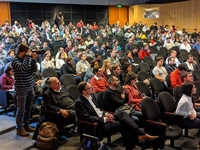
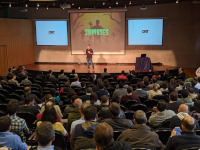
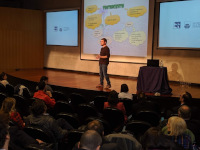
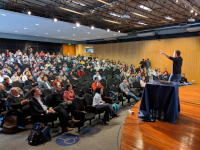
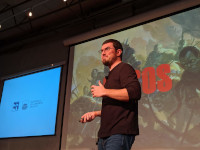
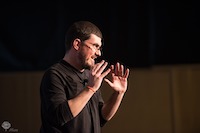
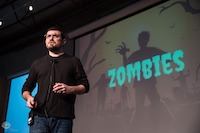
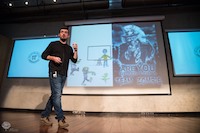
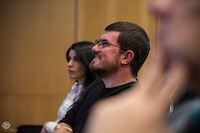
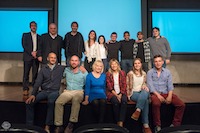
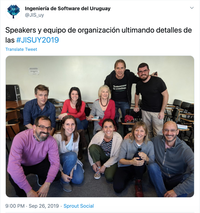
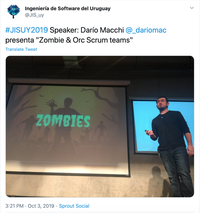
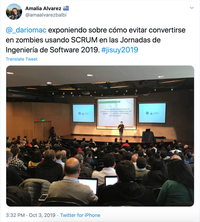
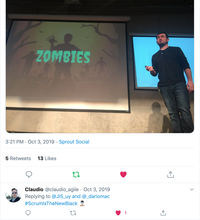
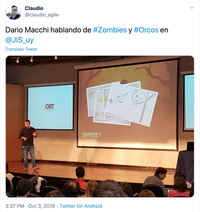
Agenda
14:30 pm - Bienvenida
Diego Vallespir y Martin Solari
14:50 pm - Agile practices for software acquisition in critical contexts
Forrest Shull - Software Engineering Institute
While Agile and DevOps software methods are hardly new concepts, their application in specialized contexts may in fact require new thinking and innovative methods of tailoring. Moving organizations to adopt Agile methods for the acquisition of systems with safety- and/or security-critical constraints can be an exciting but daunting undertaking, requiring significant effort on both technical issues as well as organizational change ones. An important goal is to obtain the desired benefits of new approaches (e.g. speed to delivery) along with existing aspects that can’t be left behind (e.g. the engineering rigor needed to develop safe and secure software with confidence). In this talk, I draw from experiences in this area to explore questions related to the interplay of research and practice. How much can prior software research work influence large-scale decisions related to software practice? “Do we trust or do we know” regarding the effects of decisions that have to be made and will have significant practical repercussions? And, can new research help fill in gaps in our knowledge, at the right speed to be relevant?
15:30 pm - Zombie & Orc Scrum teams
Darío Macchi - VAIRIX Software Development
Scrum teams must be win-win for clients and developers. But from time to time to this part there is a trend to lose-lose Scrum teams. Some were "living" teams of the first group and became zombies... losing agility with the passage of time; the most malefic, the orcs, were created without soul, for vile and dark ends. With humor, we will analyze both types of teams, finding in the public who identify with one or the other group.
16:00 pm - Un buen equipo de desarrollo logra las mejores experiencias
María José Sanguinetti - UX Consultant
When a development team is mature, it is reflected in the quality of the software. But what is a mature team? This talk is about how with less we can do more, it is not necessary to have 50 people in a project for it to be successful. On the contrary, the more content, the greater the scope and value you can deliver to your users. A mature team doesn't mean having 8 Senior full stack developers, it's having a team and it doesn't matter what roles it's made up of that have the user at the center. That they understand their needs and take care to solve their problems.
16:30 pm - Métodos Agiles: Los secretos detrás de la magia
Eduardo Miranda - Carnegie Mellon University
There is no doubt that, 18 years after the publication of the Agile Manifesto, this school of thought has come of age. The magic is obvious: happier customers, earlier initial results, quicker reaction to changes, greater autonomy and personal satisfaction, but how is this possible? How can software be developed without having all the requirements defined? How can documentation be reduced or eliminated? How can a project manager be dispensed with? Who orders and controls the execution of the tasks? In this talk we will discuss the choices and mechanisms that precede and make it possible for agile methods to work and what are the consequences of not conforming to them. This conversation is especially relevant given that few organizations use the methods as recommended by their creators and, if due to the business context or idiosyncrasy, we move away from their premises without replacing them with adequate means, we expose ourselves to failure.
17:00 pm - Break
17:30 pm - Perspectivas del desarrollo del software en el mundo de hoy. "No te gusta la sopa: diagrama de Gantt" Manuela Da Silveira
18:00 pm - Gestionar un proyecto de IS con Agile/Scrum en el Estado Uruguayo: ¿es posible?
Gabriel Fabián Ledesma - WyeWorks
The main objective of this talk is to share the experience of a project managed with Agile methodologies in the Banco de Previsión Social del Uruguay and how during that project the following questions were solved: How were the requirements solved? How was the planning of this project organized? How was the team organized? What was done to deliver software working every 15 days? Was the planned date reached? Were the different stakeholders satisfied? Was the application of an agile methodology beneficial in this context?
18:30 pm - La aventura de enseñar testing
Mónica Wodzislawski - Centro de Ensayos de Software
The construction of software is a collective process, where multiple actors intervene who negotiate their expectations, achieve successes and make mistakes. Testing seeks to mitigate the risk of production failures, both by errors and by divergences in the negotiation of expectations. Therefore, who, how, and what we teach about testing is a "quality" challenge for this community of actors. We invite you to share CES' fifteen years of experience teaching testing to computer scientists and non computer scientists.
19:00 pm - Plataformas Low Code: Qué hay de nuevo viejo?
Gastón Milano Millán - Genexus
Again, a new name for model-driven software engineering techniques. Low Code / No Code platforms as a way to build complex software systems. Low Code platforms provide environments for programmers or other profiles to build systems using techniques far removed from the traditional forms of software construction. What is the relationship with the existing concepts in software engineering, what opportunities exist for Uruguay around these platforms.
19:30 pm - Cierre y brindis


